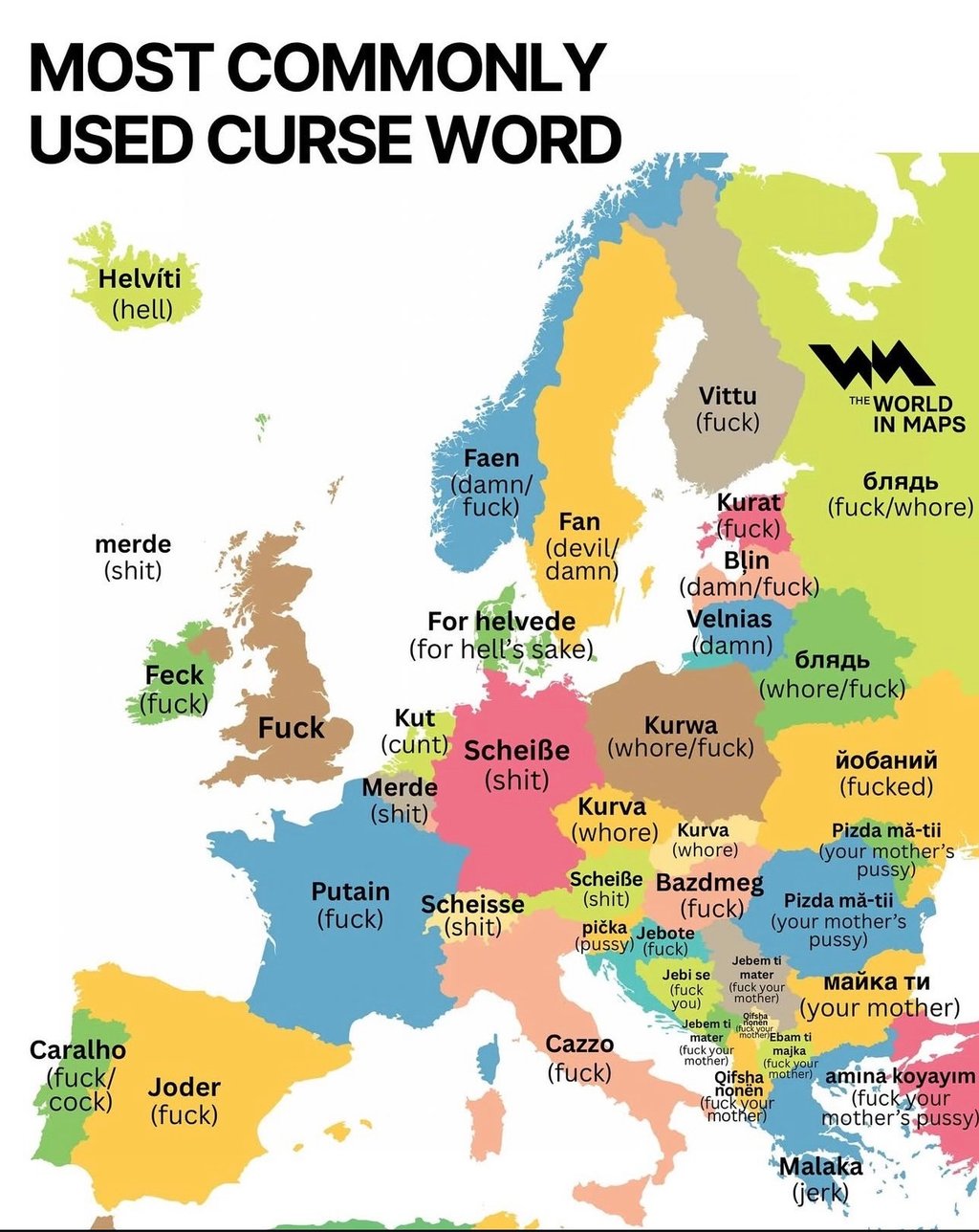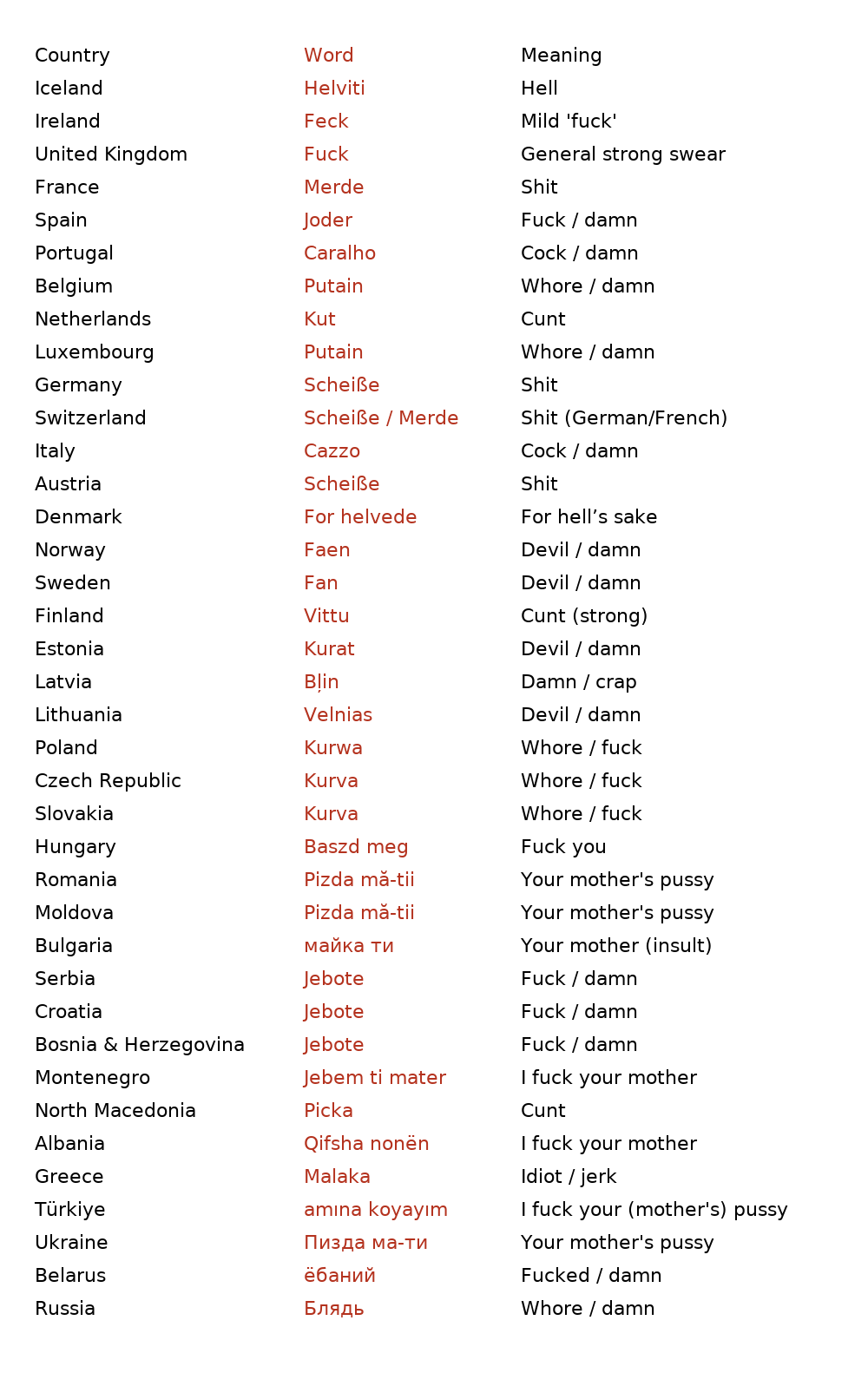Cultural Differences in European Profanity: Gender & Language
Explore how profanity varies across Europe — and what it reveals about gender, power, and cultural taboos through a feminist and linguistic lens. This in-depth article explores how curse words differ across Europe — and what they reveal about deeper cultural taboos, gender norms, and power structures. Through a feminist and linguistic lens, we examine how profanity functions as both a mirror of patriarchy and a potential tool for resistance. Includes map analysis, regional breakdowns, and commentary on who gets to swear — and why it matters.
CURIOSITYREFLECTIONS
Zayera Khan
10/27/20257 min read
What Swearing Reveals About Us
A journey through European profanity and what it tells us about gender, power, and culture
I've been thinking about curse words lately. Not because I swear often — though I do, like most people when frustrated — but because of what they reveal about us. About our cultures. About who we're allowed to be angry at, and how.
Language isn't neutral. The words we use when we're furious or hurt? They tell stories about what we fear, what we protect, and who we're willing to shame.
So let's talk about profanity across Europe. What does swearing look like from Portugal to Poland? From Iceland to Italy? And what does it reveal about gender, power, and identity?
A Map That Tells Stories
I came across a profanity map of Europe recently. Each country labeled with its most common curse word. At first glance, it's entertaining — a bit shocking, maybe. But look closer and patterns emerge.
Western Europe — the UK, France, Spain — leans toward sexual expletives. "Fuck," "putain," "joder." General-purpose anger words. Northern countries like Norway, Denmark, Iceland? They curse with the devil, hell, damnation. Existential frustration rather than personal attacks.
Then there's Eastern and Southeastern Europe. Poland. Serbia. Croatia. Slovenia. Here, the profanity hits different. Harder. More violent. "Kurwa" (whore). "Jebem ti mater" (I fuck your mother). "Pička" (cunt).
These aren't just curse words. They're weapons aimed at women. At mothers. At the female body.
Why do so many insults target someone's mother? Why is the female body the go-to territory for shame? And why is the male body almost never attacked the same way?
That's what made me want to dig deeper.
Western Europe — Where Swearing Feels Casual
In the UK, "fuck" is everywhere. It's lost its shock value, honestly. We use it for everything — surprise, frustration, emphasis, even affection in the right context. Ireland softens it to "feck," making it almost endearing.
France has "putain" (whore), but it's become like "damn" — casual, frequent, not deeply offensive anymore. Spain's "joder" (to fuck) works the same way. Portugal and Italy throw around "caralho" and "cazzo" — both referring to male genitalia — but with little shame attached.
Here's what strikes me about this: male anatomy shows up in curses, but it's almost... comfortable? Casual. Sometimes even funny. But female anatomy? Rarely used, and when it is, it keeps its sting.
Male sexuality gets normalized. Female sexuality stays taboo.
Even in supposedly progressive Western Europe, this asymmetry persists. Men swear freely and it's authentic expression. Women swear and we risk being called aggressive, unladylike, too much.
I notice this in my own life. When I curse — which I do — I'm sometimes judged differently than my male friends. That double standard is real.
Eastern Europe — Where Words Cut Deep
Eastern Europe is different. The profanity here feels heavier. More violent. More deliberately aimed to hurt.
Poland's "kurwa" means whore. It's probably the most famous curse word in Slavic languages. In the Balkans — Serbia, Croatia, Bosnia — "jebem ti mater" (I fuck your mother) is common. Slovenia uses "pička" (cunt) constantly.
These aren't general expletives. They're targeted. Personal. Almost always aimed at women — mothers, specifically, or female anatomy.
Think about what this means. The mother is sacred, yes — but that makes her the perfect target when you want to hurt someone. To dishonor someone, you attack their mother. You violate her symbolically through language.
There's no equivalent for fathers. You rarely hear "I fuck your father" as an insult. The male figure is protected. The woman — especially the mother — becomes the battleground.
This reflects something deeper about patriarchal culture. Women's bodies aren't just our own. They're symbols of family honor. Territory to be defended or attacked. Extensions of other people's dignity.
I grew up between cultures myself — Pakistani Muslim family background, Nigerian childhood, living in Sweden now. I've seen how differently cultures treat women's honor. How much weight gets placed on our behavior, our bodies, our choices.
Language reveals these structures. The curse words we use show who holds power and who gets shamed.
Northern Europe — A Different Kind of Swearing
In Scandinavia and the Nordic countries, profanity takes a different turn.
Sweden's most common curse? "Fan" — the devil. Iceland says "helviti" — hell. Norway and Denmark reference damnation, hellfire, existential frustration.
Notice something? No mothers. No female bodies. No sexual violence.
The frustration here is directed at abstract concepts — evil, fate, the universe. Not at other people's mothers or genitalia.
This aligns with something I've noticed living in Sweden. Gender equality is more embedded here. Not perfect — nowhere is — but more normalized. Language reflects that. There's less tolerance for overtly misogynistic insults.
Swearing here can still be seen as impolite, but the social policing applies more equally to everyone. Men and women face similar judgment for excessive profanity.
It's interesting. Even the way we curse can reflect whether a culture values gender equality or reinforces patriarchy.
What This All Means
Profanity isn't just bad language. It's a window into our deepest taboos. Our power structures. Who we protect and who we're allowed to hurt.
When curse words disproportionately target women — mothers, female bodies, female sexuality — that tells us something about how that culture views women. As vessels of honor. As territory. As objects rather than people.
When male sexuality appears in curses but stays casual or even humorous, that reveals the normalization of male bodies versus the stigmatization of female ones.
And when profanity shifts away from gendered attacks toward existential frustration, that suggests a culture moving — however slowly — toward greater equality.
Language isn't static, though. It changes. Feminist and queer communities across Europe are reclaiming slurs, challenging norms, creating new ways to express anger that don't degrade others.
I think about my own journey with language. Growing up, I learned to be polite. To not curse. But why should expressing frustration be gendered? Why should anger be more acceptable from men than women?
These days, I swear when I need to. I don't apologize for it. But I also try to be conscious of what words I'm using and who they target.
Because ultimately, swearing reveals more than just our mood. It reveals our values. Our biases. Our history.
The Double Standard We Give Our Children
Before we move forward, there's something else worth examining. The hypocrisy around swearing and children.
We tell children not to swear. It's rude, we say. It's inappropriate. Bad manners. We correct them immediately when they repeat a curse word they overheard. We might even punish them.
Why?
Because profanity is considered low-class, vulgar, a sign of poor self-control. Because "polite society" demands we express ourselves without resorting to crude language. Because children should be innocent, pure, protected from adult corruptions.
But here's the contradiction: adults swear constantly. We swear when we stub our toe, when traffic is terrible, when we're frustrated at work, when we're laughing with friends. We swear in movies, in music, in conversations. Children hear us. They absorb it. They understand exactly what these words mean and when to use them.
Then we turn around and tell them, "Don't say that. That's a bad word."
What message does this send?
It teaches children that adults have privileges they don't. That there are rules for them and different rules for us. That authenticity and emotional expression are conditional — allowed only when you reach some arbitrary age of maturity.
We also tell adults to watch their language around children. Be a good role model, we say. Set a good example. Don't swear in front of kids.
But what are we really modeling when we do this?
We're modeling suppression. We're teaching children that certain emotions — anger, frustration, shock — shouldn't be expressed honestly. That there's a "proper" way to feel and a "proper" way to speak, and authentic human reaction doesn't fit that mold.
I think about this as someone who grew up in a Muslim household where polite speech was enforced strictly. Especially for girls. Especially for the eldest daughter. You don't raise your voice. You don't use crude language. You maintain composure at all times.
What I learned from this wasn't self-control. It was performance. I learned to hide my real feelings. To swallow frustration. To present a version of myself that was acceptable. But in my teenage years, I started expressing anger inwards.
The double message confused me for years. Adults cursed when they thought I wasn't listening. Characters in movies swore constantly. But I wasn't allowed to? Why? Because I was young? Because I was female? Because someone decided these words were "bad" even though everyone used them?
This is the problem with how we treat profanity around children. We don't explain why these words carry weight. We don't teach context or impact. We just say "don't" while doing it ourselves.
If we were honest, we'd acknowledge that swear words aren't inherently bad. They're contextual. They're cultural. They can hurt when aimed at someone, or they can be harmless expressions of emotion. The issue isn't the words themselves — it's how and when and at whom they're directed.
But we don't have that nuanced conversation with children. We just create arbitrary rules that we ourselves don't follow. And children notice. They see the hypocrisy. They learn that adult authority is inconsistent.
Maybe instead of policing language, we should teach emotional literacy. Help children understand why certain words hurt. Why context matters. Why expressing anger is valid, but how we express it impacts others.
Because right now? We're just teaching them to hide their authentic selves until they're old enough that society stops caring.
Where Do We Go From Here?
Understanding profanity is about understanding power. Who gets to speak freely? Who gets policed? Whose identity becomes the target when emotions run high?
Across Europe, these patterns vary dramatically. Eastern Europe still leans heavily on misogynistic, mother-based insults. Western Europe blends casual sexuality with lingering double standards. Northern Europe shows how profanity can evolve when gender norms shift.
But everywhere, women navigate a landscape where our words are judged differently. Where our bodies become symbolic territory in other people's conflicts.
That's worth paying attention to.
Next time you hear someone curse, listen closely. What are they really saying? Who are they targeting? What does that reveal about the culture they come from?
Language is always political. Profanity especially so. It tells the truth — even when society tries to hide it.
What are your thoughts on profanity and gender? How do curse words work in your language or culture? I'd love to hear your perspective.
ChatGPT-5 generated the initial draft, which was subsequently reviewed and revised by the author. Claude AI was used to maintain and refine the author’s stylistic voice.





